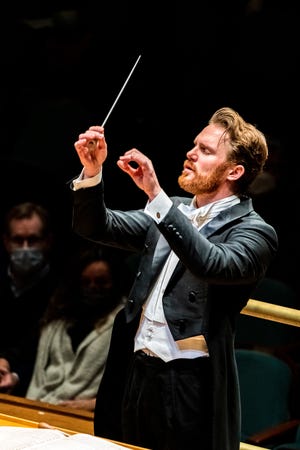
Subsequent 7 days we complete the remaining classical concert events of the year. We’ll open up with a brand name-new do the job composed by Tarik O’Regan, commissioned by the Jacksonville Symphony. O’Regan was born in England of Irish and Algerian mom and dad and now life in the U.S. His piece, “Trances,” is an exploration of his childhood memories of Moroccan pop audio. It is a intriguing glance at how time influences our recollections, like a haze of fog that impacts our vision.
Right after that we’ll complete Ludwig van Beethoven’s Ninth Symphony. It’s tough to know in which to start out when conversing about this colossus, which is just one of the most essential, beloved and powerful parts of art in Western tradition. It is unique from Beethoven’s other symphonies because it introduces words and phrases for the initial time, sung by a choir and a quartet of soloists. When we hear to any of Beethoven’s other 8 symphonies, we are listening to summary new music that doesn’t have concrete semantic meaning — they are just music, like an abstract painting is just art. But because of the introduction of text, the Ninth is about a thing.
We need to hold out until finally the finale to hear any phrases. The initial three actions continue as you could possibly anticipate in one more symphony: a rapid allegro, a scherzo and a gradual motion. The initial is dark and violent. In my impression, it is a depiction of evil, damage or loss of life. It is songs of terror: dark and unrelenting. The second proceeds this tone, but in the form of a wild dance. Stanley Kubrick was correct to use it to accompany scenes of destruction in his movie “A Clockwork Orange.” In the sluggish motion, we eventually escape this darkness. In 1 of his most beautiful adagios, Beethoven writes a established of versions on two sublime themes, each entire of consolation.
This sense of aid is shattered at the begin of the finale, with a chord intentionally created to offend our ears. It is as if the orchestra is looking for a way ahead, a solution to the despair of the initial two actions. They don’t obtain it, and the dissonant chord returns as if nothing at all has improved. Only now do we hear words and phrases for the 1st time, as the solo bass sings, “Oh pals, not these seems! Instead permit us sing much more cheerful and more joyful kinds. Joy! Pleasure!”
Beethoven proceeds to set Friedrich Schiller’s “Ode to Joy.” He’d been obsessed with this poem given that his teenagers but couldn’t determine out how to set it till substantially later on in lifestyle. The poem is pretty significantly a item of the Enlightenment, whole of the sentiments of common brotherhood, cooperation and adore that so encouraged Beethoven all over his life. He experienced typically been a sort of class warrior, refusing to bow to users of the aristocracy in Vienna, whom he saw as his equals. Egalitarian to the core, Schiller’s words and phrases impressed Beethoven to write audio of unrelenting and emphatic optimism. It is joy that is the answer to the darkness of the opening two actions. Joy enlivens, inspires and unites us, for “all men and women come to be brothers, the place joy’s gentle wings alight.”
That optimism can be a sticking stage for us right now. How can we think in common bonds among all folks when our country is so divided, immediately after the 20th century’s cruelty, following Russia’s brutal invasion of Ukraine? We’re suspicious of everyone who statements we can all be a single immediately after the gulags and the concentration camps.
The Ninth can appear to be cloyingly naïve, simplistic and outmoded. And still, its ravishing beauty and power demand that we pay attention. To paraphrase the amazing author Richard Taruskin, “Beethoven’s gigantic affirmation nonetheless awakens in us longings for what we can no for a longer time believe that in but wish we could. And that offers us hope.”
Courtney Lewis is audio director of the Jacksonville Symphony.
Beethoven’s Ninth: Ode to Joy
Jacksonville Symphony with soprano Elaine Alvarez, mezzo-soprano Tamara Mumford, tenor Cooper Nolan, baritone Anthony Clark Evans and the Jacksonville Symphony Refrain
7:30 p.m. Friday and Saturday at the Times-Union Centre
$25-$77
